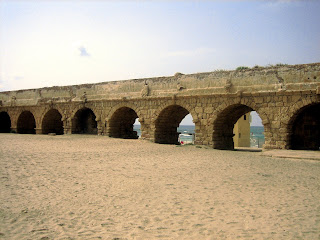We started out the day at Caesarea, a beautiful site on the edge of the Mediterranean Sea where Herod had another of his palaces. I stood in one of the rooms where John the Baptist may have been imprisoned, and climbed the steps of a giant Roman-style theatre. I love being on the sea, but for the ancient Israelites, the sea represented evil and everything that was wrong with the world (Is. 57:19-21; Ps. 107:23-30; Rev. 13:1, 21:1). However, for the rest of the world, the sea represented the potential for wealth and success. Caesarea was like Hollywood or Manhattan—a place where worldviews were exchanged along with goods from across the sea, and culture was shaped and changed as a result. For orthodox Jews, this pagan, non-kosher city was not a comfortable place; they avoided it as much as possible. In the same way, for fundamentalist Christians, Hollywood is not a comfortable place, so they avoid it as much as possible. But is this the correct response? Does Hollywood actually shape a culture’s values, or does it simply express the values of a culture? Should Christians avoid or ignore the evil aspects of culture surrounding them in an effort to remain pure and righteous? Or should they actively seek to influence and redeem their culture for the glory of Jesus? How should the church engage culture today?

I am far from having conclusive answers to these questions, but I think about them often, and my experience at Caesarea shed some light on Scripture that points us to the answers.
In Acts 9-10, we read about Peter traveling from Lydda to Joppa as he ministered. Both cities are west of Jerusalem, and traveling there would have required Peter to leave his comfortably-Jewish environment and come face-to-face with Hellenistic culture. Fortunately, he found Simon, a fellow Jew, to stay with in Joppa. Peter probably thought he was really pushing the limit by staying in a pagan city, but at least he could keep kosher and observe Shabbat within his safe circle of Jewish friends.
However, Peter’s world was soon rocked to the core. First, he received a vision from the Lord in which God commanded him to eat non-kosher food! Three times Peter refused—it was inconceivable to him that God would ask such a thing; it must be a test. As he’s still scratching his head wondering what that was all about, some men show up at the door and tell him that Cornelius (clearly a Greek name) wants Peter to come to his house in Caesarea (one of the most pagan cities in the region). Not only is Cornelius a Greek, he is a centurion of the Italian cohort. He not only stands in opposition to everything Peter stands for, but has devoted his whole life to protecting and promoting his pagan worldview. On the scale that measures “Gentile-ness,” Cornelius is at the very top. Normally, Peter would have refused his invitation immediately, so the Holy Spirit has to clearly tell him to “go down and accompany them without hesitation” (10:20). Peter must have been petrified, but he obeys.
The rest of the story is well-known. Peter goes to Cornelius’ house in Caesarea, and tells them, “You yourselves know how unlawful it is for a Jew to associate with or to visit anyone of another nation, but God has shown me that I should not call any person common or unclean” (10:28). He share the gospel with them, many of the Gentiles are saved, receive the Holy Spirit, and are baptized. God chose Caesarea—a totally pagan culture-making center—to be the launch pad of the gospel to the Gentiles.
What implications does this have for the church today? I would like to suggest two:
1. Like Peter, the church must get out of its comfortable Christian sub-culture and take risks to engage the world around them. The church should not be afraid to penetrate the spheres of Hollywood, public universities, the music industry, theater, sports, business, and government. Instead, the church should be encouraging its members to get involved and live as followers of Jesus in each of these areas. We should actively work to influence and redeem our culture for God’s glory.
2. Like Peter, the church must not compromise righteousness in order to share the gospel, but we must make the gospel relevant to culture by living within it. We must not relax the requirements of Scripture or our personal convictions, but we must be willing to share life with people who do not share our values. We never hear about Peter eating non-kosher food, yet he agreed to stay in the home of Cornelius and his family. We must live differently as followers of Jesus in the very midst of our culture.

Orientating my map at on Mount Carmel

No comments:
Post a Comment